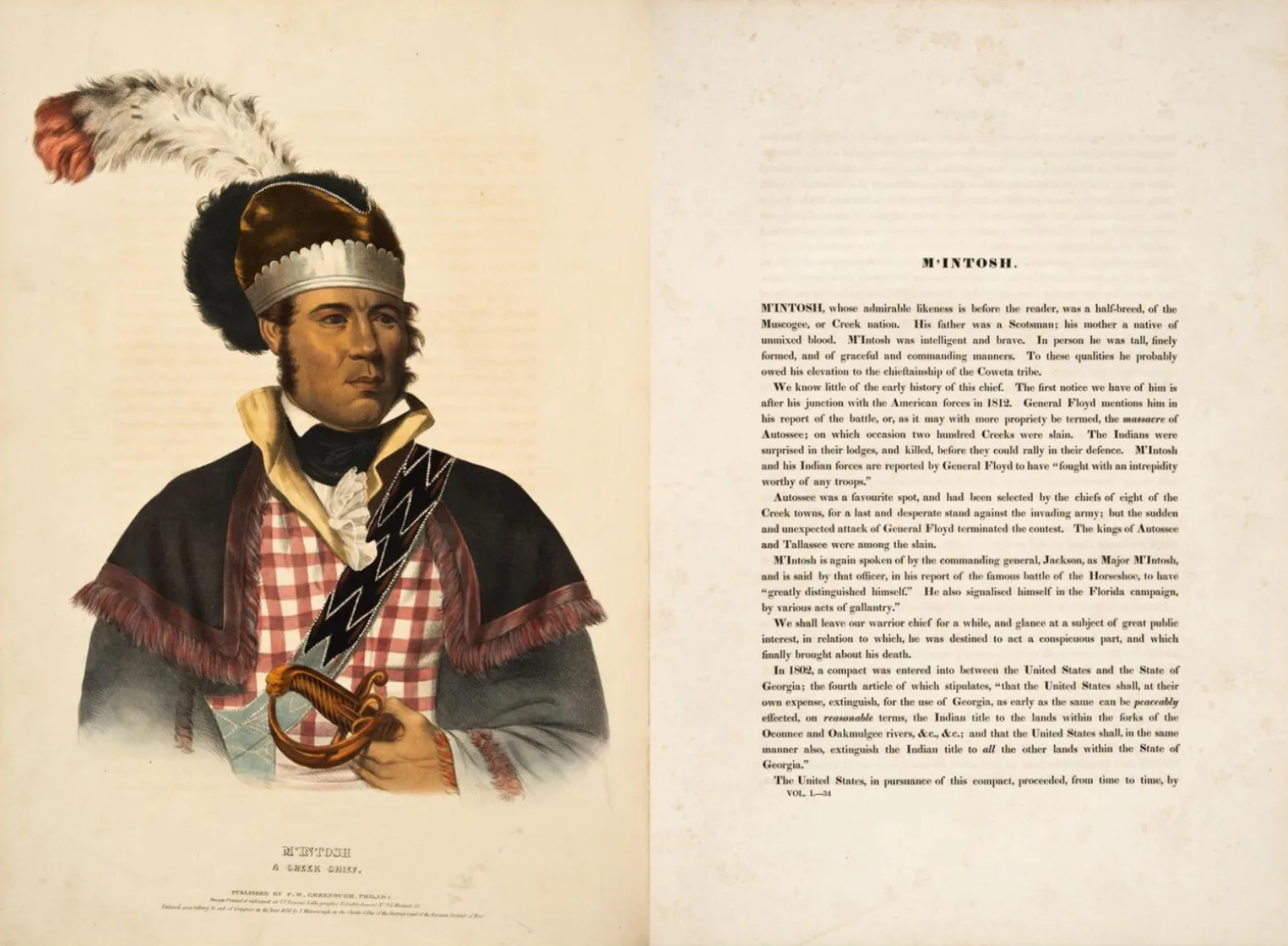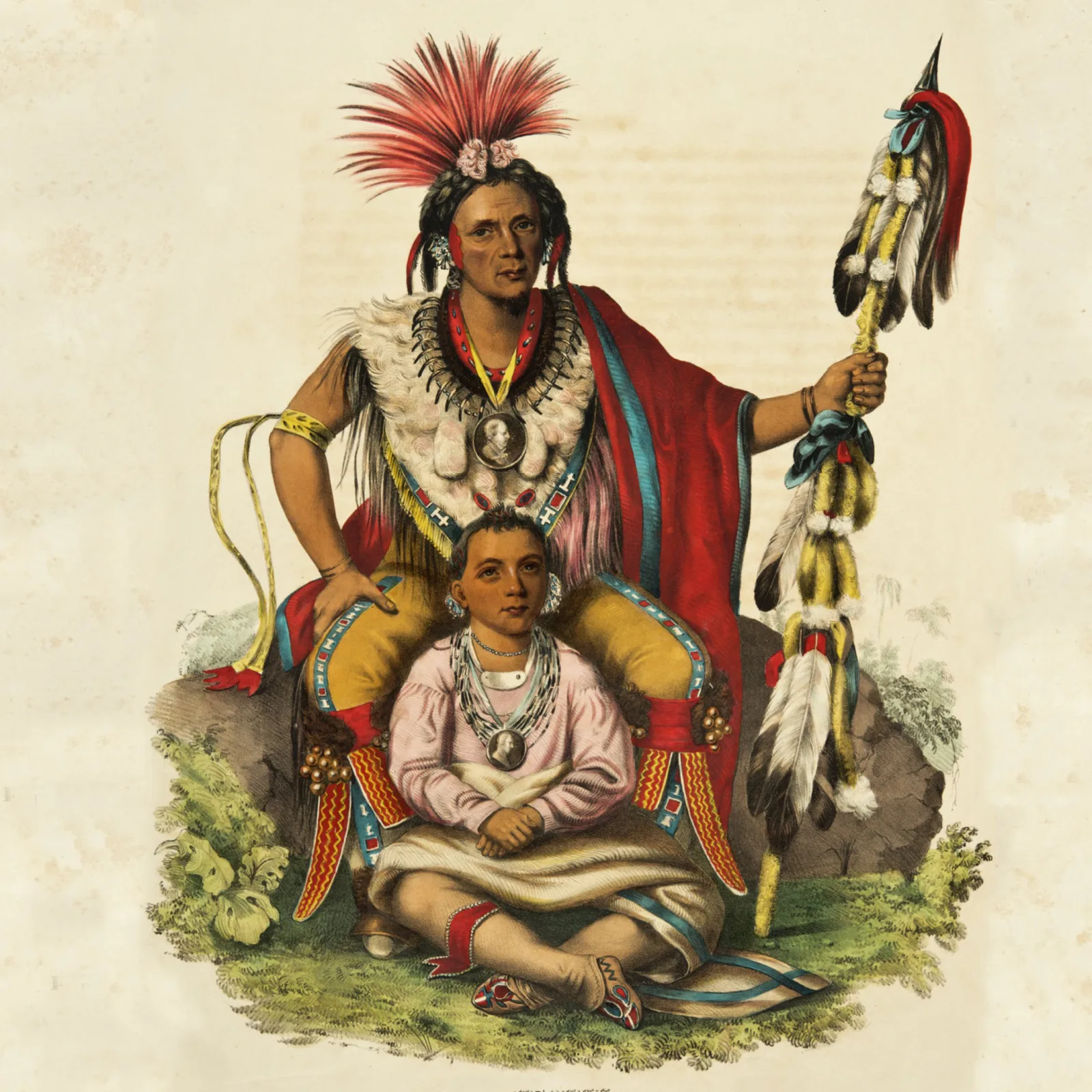November was National Native American Heritage Month, an annual opportunity to remember and learn more about Indigenous history on our continent. The Newberry celebrated with the opening of a new exhibition focused on a remarkable snapshot of America’s Native population at a moment of change nearly two centuries ago. Indigenous Portraits Unbound: Reflections on Iconic Images of Resilience is on view in the Newberry’s Hanson Gallery through March 30, 2024, and is made possible thanks to a recent acquisition that is almost, but not quite, a duplicate of an item the library has already held for some time.
Indigenous Portraits Unbound displays one of the more rare and expensive books from pre-Civil War America, the extraordinary History of the Indian Tribes of North America. The book was originally published by subscription as a series of twenty fascicles, or pamphlets in paper covers, that were intended to be collected as a set and then bound into volumes by their owners. The subscriptions were advertised as a luxury good; only 1,250 subscribers signed up for the work.
Conceived by Thomas McKenney, the U.S. Superintendent of Indian Trade (1816-24) and Indian Affairs (1824-30), the book depicts 120 leaders and auspicious members of many Indigenous tribes. The book and its images simultaneously confirmed European conceptions and misrepresentations of Indigenous people to white audiences and contributed to pride in Indigenous heritage and intertribal solidarity among Native people. (The complete book has also been digitized and is viewable here.)
The library has owned a complete bound copy of the publication for decades, but it was only in 2021 that a generous supporter donated their copy of the original twenty unbound fascicles. These unbound copies offer us the opportunity to present multiple portraits from the book at once, which we’ve done in the exhibition: ten portraits are displayed in the Newberry’s Hanson gallery.
“This exhibition showcases the Newberry’s collection of rare books for American Indian and Indigenous Studies, one of the best collections on the topic in the world, says Will Hansen, Roger and Julie Baskes Vice President for Collections and Library Services and Curator of Americana, and the exhibition's curator. "It bears witness to Indigenous people from across the continent at a period of great upheaval and change, and to their resilience and survival to the present day. We hope it will inspire visitors to explore more about the portrait subjects in our collections.”

Each printed edition consisted of lithographs based on original oil paintings, almost all of which have since been lost to fire. Each lithograph was meticulously hand-colored; it is unsurprising that each fascicle cost $6 at the time of its issue–a complete run cost the equivalent of about $4,000 in today’s money. At six images per fascicle, twenty fascicles to a set, and 1,250 printed, that comes to 150,000 lithographs, with dozens of laborers and artisans involved in bringing the book to fruition.
Beyond the subjects posing for their portraits, the original History was not created with the essential input of America’s Indigenous peoples of the day, and so betrays stereotypes as well as clear misinformation (Chicago, for instance, is depicted as being part of Indiana). Early on in planning the Newberry’s exhibition, Hansen and the exhibitions team agreed that seeking twenty-first century tribal involvement would be vital in telling accurate stories of the book’s subjects and their histories and cultures. For all the text accompanying the History’s original images, the Newberry worked with tribal historical preservation officers and other representatives to approve the text; in most cases, tribal representatives wrote the text themselves. The blurb for William McIntosh Jr. was even written by one of McIntosh’s direct descendants.
Support for exhibitions like Indigenous Portraits Unbound is provided by donors like you, who support all manner of expenses from staff time, installation labor, cataloging and processing, marketing and public engagement, and much more. We hope you’ll join us at the library for Indigenous Portraits Unbound, now open through March 30, 2024.
This story is part of the Newberry’s Donor Digest, Holiday 2023. In this newsletter, we share with donors exciting stories of the work made possible by their generosity. Learn more about supporting the library and its programs.
